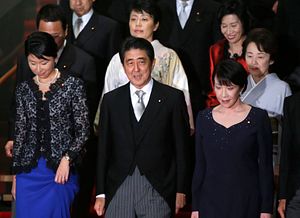Japanese Prime Minister Shinzo Abe’s newly installed Cabinet and Liberal Democratic Party leadership are currently enjoying high approval ratings, as the public welcomes a change that has not only brought in new faces, but also an increase in leadership roles for women in government. While riding high on this popularity, two new officials have made a key public misstep that could not only draw negative attention at home, but potentially derail ongoing negotiations to improve relations with neighbors South Korea and China. The photographs of two new Cabinet members taken with a public figure of the neo-Nazi party in Japan could further fuel anti-Japanese sentiment in the region, and could cool signs of improving ties in Northeast Asia.
According to a poll conducted by the Yomiuri Shimbun last Wednesday and Thursday, Abe’s Cabinet reshuffle experienced the biggest increase in approval rating since the newspaper began monthly polling in March 1978. The Cabinet’s approval jumped from 51 percent in early August to 64 percent right after the new administration was announced last week. Many pundits view the jump in approval as a necessary public mandate for Abe in order to push forward with potentially difficult structural economic reforms and another tax increase, as revised economic figures for the second quarter showed the previous tax increase led to a decline in GDP of 7.1 percent.
The increase to five female Cabinet members led to an 18 percent gain in approval rating over August among women, with 71 percent of Japanese women approving of the greater female presence in the new government. The move also falls in line with Abe’s goal of increasing the percentage of women in leadership roles nationwide to 30 percent by 2020.
Amidst this new wave of popularity, two of Abe’s new appointees have been shown in photos with the leader of the National Socialist Japanese Workers Party, Kazunari Yamada. Internal Affairs Minister Sanae Takaichi and LDP policy chief Tomomi Inada took separate photos with Yamada in 2011 when he visited their offices “for talks,” according to Yamada’s blog. The fringe party leader has also praised the September 11 terror attacks on New York City and voiced his admiration for Adolf Hitler.
Following the release of the news on Monday, both women were quick to deny any political connection to Yamada. While their offices admitted that the photos were real, both seem to indicate that they did not know who Yamada was when he visited. A member of Takaichi’s staff told the AFP that “he was an assistant for an interviewer, and was taking notes and photos,” and that “we had no idea who he was back then, but he requested a snap shot with her.” A member of Inada’s office said she did not subscribe to Nazi ideology, and that “It is disappointing if there are people who would misunderstand that she does.” Indeed, Yamada’s party does not have any representation in the Japanese Diet, and there is no public link between him and the two politicians.
However, Abe continues to deal with criticism of overt nationalism and the denial of wartime atrocities like the Japanese use of “comfort women.” This criticism exists in Japan, but especially in countries that are part of Japan’s World War II colonial past like China and South Korea. Compounding this problem for the new Abe government is the fact that both of these new appointees have visited Yasukuni Shrine, where 14 Class-A war criminals are interred. This too is nothing that far out of the norm for Japanese politicians and officials, yet it is also an issue Abe has sought to distance himself from somewhat since his visit in December of last year. He skipped visiting the shrine when many others did this year on August 16, commemorating the end of the War in the Pacific, in hopes of holding bilateral talks with Chinese President Xi Jinping later this year.
Inada was listed as a “revisionist lawmaker” by the Japan Times in 2007 for supporting the film The Truth About Nanking, which claims “the evidence for a massacre is faked.” On Friday, Takaichi said she would continue to visit Yasukuni Shrine now that she is a Cabinet member, telling reporters, “I’ve been visiting Yasukuni as one Japanese individual to offer my sincere appreciation to the spirits of war dead.” Whether she will hold to that statement after the apparently inadvertent photo with Yamada is unclear, but Abe in all likelihood will be intent on limiting further attention in this vein, particularly this fall as he seeks to hold key bilateral meetings with Xi and possibly another meeting with South Korean President Park Geun-hye. Abe’s opponents abroad are quick to draw attention to signs of nationalist or racist sentiment within his government. In that light, the room for mistakes is very limited if he hopes to improve regional ties in the short term.

































